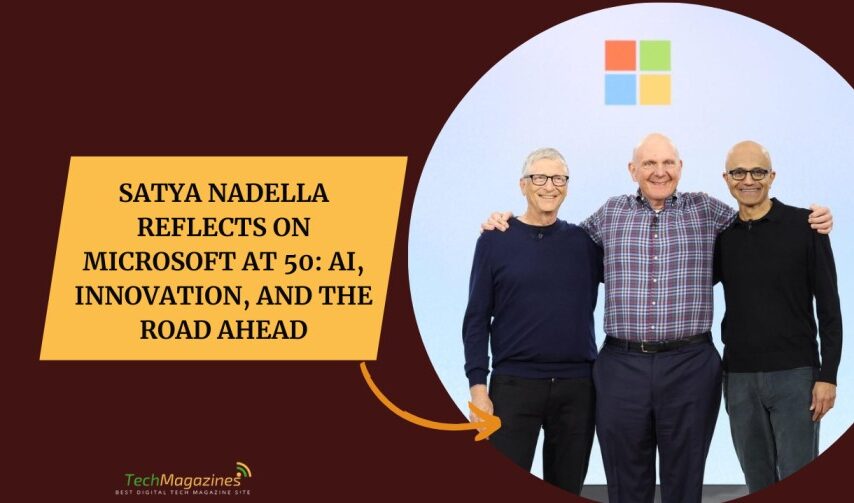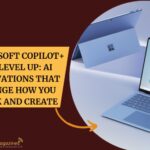While Microsoft turned 50, Satya Nadella did not celebrate with a shower of confetti—he was more focused on a reorientation. At the intersection of what has been achieved and what is to come, he described the company’s history as extraordinary but left no doubt about this: the future – and particularly in artificial intelligence – is where the potential is even greater. At the anniversary event, Nadella paid his respect to the OGs in the room: Gates and Ballmer, who laid the foundation for Microsoft as a garage-code to the global infrastructure.
He did not give the usual corporate gratitude speech. It was not a celebration of the genre, but a tribute, and a rather humble one at that, though thankful. A passing of the baton, not a relic-polishing ceremony. He also provided room for Paul Allen who remains part of Microsoft’s legacy to this date. He said that their early vision was not only to create software but to create possibility. And now, half a century in, that possibility is turning into machine intelligence. The takeaway? Microsoft’s past may have been applauded, but Nadella is looking forward to whatever is next. And he’s not blinking.
The Power of Tools: How Simple Ideas Built a Tech Empire
Three Microsoft CEOs walk into a room on Microsoft’s 50th anniversary … and are interviewed by Copilot! pic.twitter.com/5E8wHCDV92
— Satya Nadella (@satyanadella) April 4, 2025
Nadella said it started with a simple idea. That idea was to help people make technology that would make it very efficient and effective for others to innovate. That was the spark. Their first product was a Basic interpreter for the Altair. It was small, but it lit a fire. The personal computer was born, and the world changed.
He spoke of the fifty years behind them. They mattered. But what mattered more was what came next. The next fifty. The real work. The real meaning. He said the future wouldn’t be measured by what they made, but by what others made because of them. Not how long they lasted—but how much they mattered.
Accelerating the AI Era
A big part of that future is AI. It’s here. It’s moving fast. Nadella said they had to put it in people’s hands. Make it real. Make it useful. Like they did with the first PCs. Now, with things like GitHub—where over 150 million builders work—they were giving people the tools again. Letting them shape the world.
Agent Mode and Beyond
Nadella spoke of something new. It is known as Agent Mode for Visual Studio Code. He quipped that the only time you realize that intelligence has become commoditized is when CEOs begin vibe coding. But then his tone changed. This wasn’t a toy. It was power. Real power. The one that allows people to extend their reach to a level they never thought possible. The Agent Mode would be delivered to each user. It brought AI that was integrated into the work process, as a teammate. It guessed what you needed.
This was only the start. There would be Code Review Agents. And there would be tools to assist others to create their own—based on what was known as Azure AI Foundry. Nadella referred to it as an “agent factory.” They are not only building agents. They are constructing the whole path. From experiment, to calibration, to trying out, to understanding what does not work. They are creating something larger, a new form of cooperation for numerous agents. He said that focusing on building trustworthy AI systems is critical for the future.
AI for All, Not Just Developers
Nadella spoke of change. Microsoft was still a platform, but now it reached further. It wasn’t just for developers anymore. It was for everyone. That was the mission. To give people the tools to do more. To help them in work, in life, in play. Tools like Copilot. Quiet, steady help. Always there. Always working.
Final Words
As Microsoft turns fifty, Nadella is not interested in the cake but what is brewing in the innovation kitchen. The company that once showed us how to point and click is now showing machines how to think and innovate. When such terms as “vibe coding” start being incorporated in the CEO’s vocabulary, one is sure that the organization has crossed the Rubicon technologically. From the basic interpreters to the AI agents that guess your next line of code, Microsoft’s evolution story is a roller-coaster ride that is very much in tune with the tech industry, only they are often at the wheel.
Nadella’s vision is not about gussying up the company’s legacy hardware business; it is about integrating the future of AI into its DNA. The Microsoft Gates and Ballmer created was already quite formidable, but the Microsoft that Nadella is fashioning is something altogether different: an organization in which people and machines play off each other like musicians in a big band. As the company enters its first 50 years of existence, Microsoft is not ready for the midlife crisis, but rather for the second youth, with all the potential for rapid development and genius.







